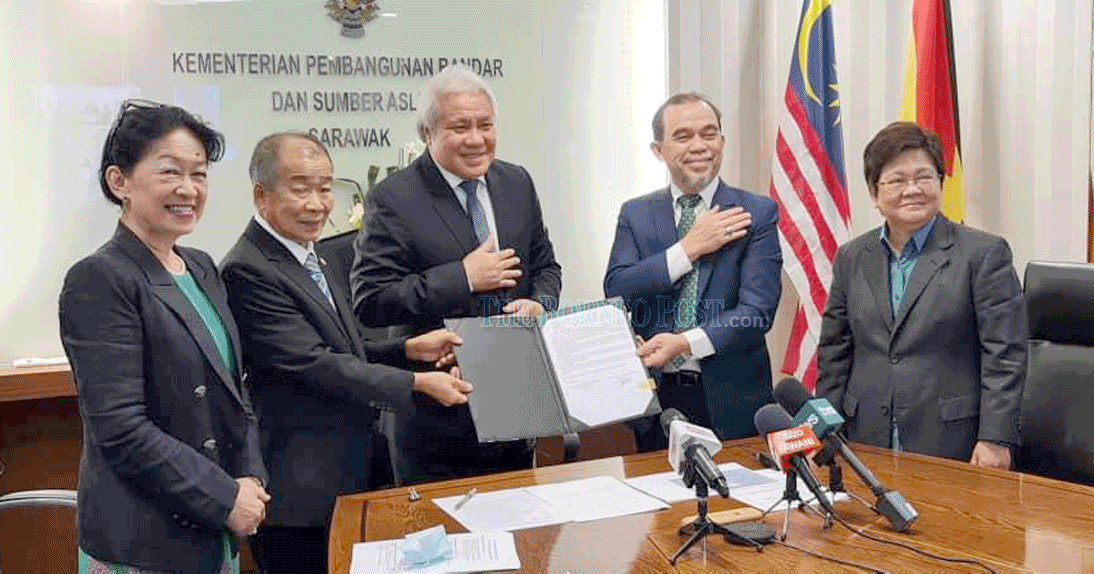KUCHING: Sarawak Timber Industry Development Corporation (STIDC) has established collaboration with POLI.design, Milan, Italy on potential areas of research and design to develop the local timber industry.
According to STIDC, POLI.design, with the Design Department and the School of Design, contributed to classification of the Politecnico di Milano as the fifth best university in the world, based on the QS Ranking 2021 (Art & Design field).
The virtual Memorandum of Understanding (MoU) signing ceremony was done yesterday and was witnessed by Deputy Chief Minister Datuk Amar Awang Tengah Ali Hasan, who is also chairman of STIDC Board of Management.

Awang Tengah (centre), assistant minister Datuk Mohd Naroden Majais (second left), Hashim (second right) and other senior staff of STIDC posing for a photo for their Italian counterparts during the virtual MoU signing ceremony yesterday.
At the signing ceremony, STIDC was represented by general manager Hashim Bojet while POLI.design was represented by its chairman Professor Francesco Zurlo.
The corporation said the MoU was very important for both STIDC and POLI.design because it marked the beginning of collaborative efforts which will bring mutual benefit to both parties and both countries.
The effort marked yet another milestone for STIDC to intensify the corporation’s engagement and collaboration with international institutions, such as POLI.design, in the efforts to develop the local timber industry.
The main objective of the MoU is for STIDC and POLI.design to collaborate and conduct research on materials that are available in the state.
It is also to work on programmes to increase exposure for the Sarawak Young Designers to promote Sarawak’s own brand in Italy and in Europe.
STIDC has developed and implemented Sarawak Young Designers (SayD’SignersSarawak) Training Programme since 2018 in collaboration with Universiti Malaysia Sarawak (Unimas) and Design and Fine Arts Faculty (FSRD), Institute Teknologi Bandung (ITB) through the signing of MoU and Memorandum of Agreement (MoA) respectively.
It is a two-year training programme with the first-year industrial attachment with local furniture manufacturers in Sarawak.
The second-year training will be an attachment at FSRD to further enhance their design skill and knowledge.
“The objective of this training programme is to train fresh graduates from the local universities in furniture designs and to serve the furniture industry in Sarawak. This collaboration will also be looking into enhancing the skill and talent of our young designers,” said STIDC.
Through this collaboration and with the help of POLI.design, STIDC said the Sarawak Young Designers will be able to increase their international exposure and widen their knowledge on design.
It also said the research into the existing vast availability of local materials was very much needed.
“Sarawak has more than 2,000 different kinds of wood species that can be explored and researched in terms of usefulness and utilisation as materials for production of exotic and luxury furniture.”
STIDC said those data and information collected and verified through the research and development process will enable the corporation to establish a Material Lab in the state.
It is now also embarking into research on bamboo, a raw material that will supplement local materials for the furniture industry.
“STIDC is also working closely with the private sector to develop bamboo industry in the whole supply chain for production of bamboo products for export.”
In addition, it stated that they had started research on Acacia with the private sector as an alternative material for furniture industry, which were said to be among the few local materials that STIDC had identified and explored for its potentiality to sustain the development of the state’s timber industry.
In 2020, STIDC said the state’s export to Europe was only RM1.2 million, mainly in the form of secondary products such as plywood, and it accounted for less than one per cent of the state’s total export earnings.
The corporation hoped the collaboration with POLI.design will enable the state to expand further the market share in Europe, especially for furniture.
